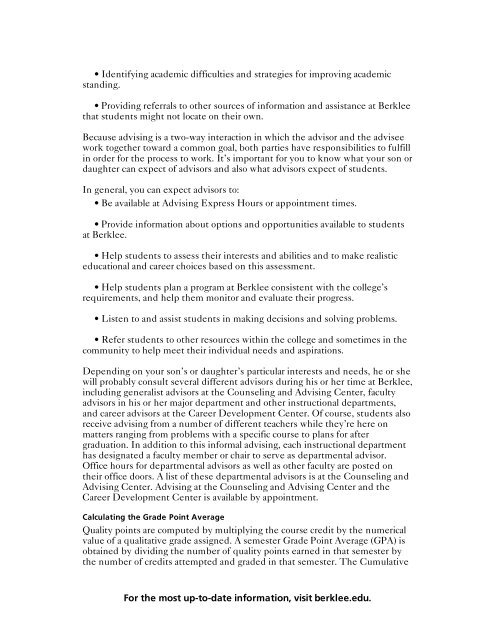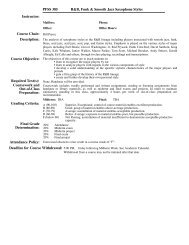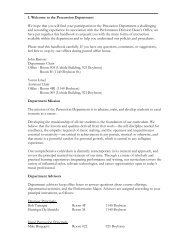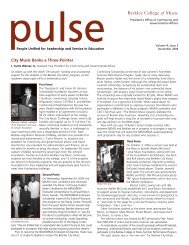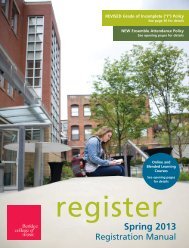Parent Handbook 2010–2011 - Berklee College of Music
Parent Handbook 2010–2011 - Berklee College of Music
Parent Handbook 2010–2011 - Berklee College of Music
Create successful ePaper yourself
Turn your PDF publications into a flip-book with our unique Google optimized e-Paper software.
• Identifying academic difficulties and strategies for improving academic<br />
standing.<br />
• Providing referrals to other sources <strong>of</strong> information and assistance at <strong>Berklee</strong><br />
that students might not locate on their own.<br />
Because advising is a two-way interaction in which the advisor and the advisee<br />
work together toward a common goal, both parties have responsibilities to fulfill<br />
in order for the process to work. It’s important for you to know what your son or<br />
daughter can expect <strong>of</strong> advisors and also what advisors expect <strong>of</strong> students.<br />
In general, you can expect advisors to:<br />
• Be available at Advising Express Hours or appointment times.<br />
• Provide information about options and opportunities available to students<br />
at <strong>Berklee</strong>.<br />
• Help students to assess their interests and abilities and to make realistic<br />
educational and career choices based on this assessment.<br />
• Help students plan a program at <strong>Berklee</strong> consistent with the college’s<br />
requirements, and help them monitor and evaluate their progress.<br />
• Listen to and assist students in making decisions and solving problems.<br />
• Refer students to other resources within the college and sometimes in the<br />
community to help meet their individual needs and aspirations.<br />
Depending on your son’s or daughter’s particular interests and needs, he or she<br />
will probably consult several different advisors during his or her time at <strong>Berklee</strong>,<br />
including generalist advisors at the Counseling and Advising Center, faculty<br />
advisors in his or her major department and other instructional departments,<br />
and career advisors at the Career Development Center. Of course, students also<br />
receive advising from a number <strong>of</strong> different teachers while they’re here on<br />
matters ranging from problems with a specific course to plans for after<br />
graduation. In addition to this informal advising, each instructional department<br />
has designated a faculty member or chair to serve as departmental advisor.<br />
Office hours for departmental advisors as well as other faculty are posted on<br />
their <strong>of</strong>fice doors. A list <strong>of</strong> these departmental advisors is at the Counseling and<br />
Advising Center. Advising at the Counseling and Advising Center and the<br />
Career Development Center is available by appointment.<br />
Calculating the Grade Point Average<br />
Quality points are computed by multiplying the course credit by the numerical<br />
value <strong>of</strong> a qualitative grade assigned. A semester Grade Point Average (GPA) is<br />
obtained by dividing the number <strong>of</strong> quality points earned in that semester by<br />
the number <strong>of</strong> credits attempted and graded in that semester. The Cumulative<br />
For the most up-to-date information, visit berklee.edu.


